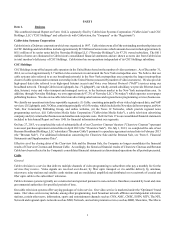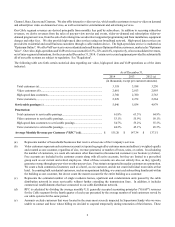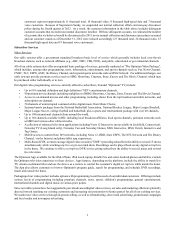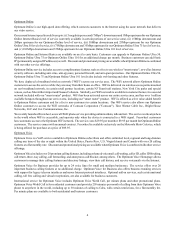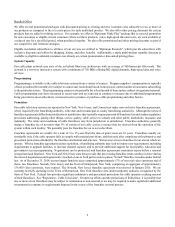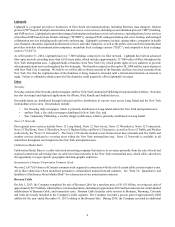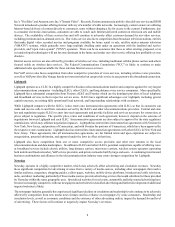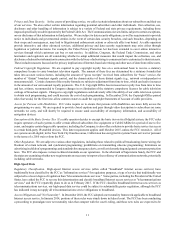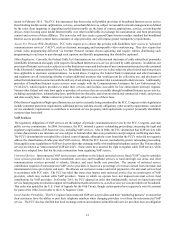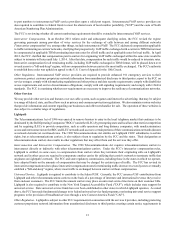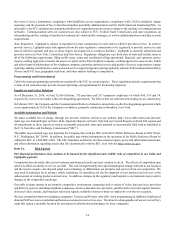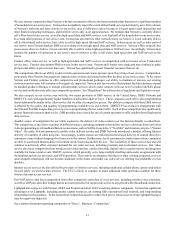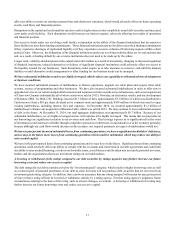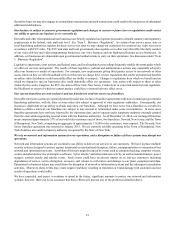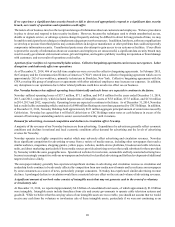Cablevision 2014 Annual Report Download - page 16
Download and view the complete annual report
Please find page 16 of the 2014 Cablevision annual report below. You can navigate through the pages in the report by either clicking on the pages listed below, or by using the keyword search tool below to find specific information within the annual report.10
which the operator of that system has an attributable interest. The FCC established a national limit of 30% on the number of
multichannel video households that a single cable operator can serve, but that limit was invalidated by a federal court in August
2009 and the FCC has not yet established a new limit. The FCC also created a limit of 40% on the number of channels on a cable
television system that can be occupied by video programming services in which the operator of that system has an attributable
interest, but that rule was invalidated by a federal court in 2001 and the FCC has not yet established a new limit.
Set Top Boxes. The FCC currently requires cable operators to separate the security functions of set-top boxes from the channel
navigation and other functions of those boxes, in order to promote a retail market in these boxes and other so-called "navigation
devices". Operators must provide a security card (called a CableCARD) to consumers who purchase televisions and other consumer
electronics equipment with an appropriate card slot so that they can connect those devices directly to digital cable television systems
to receive one-way digital programming without the need for a set-top box. The FCC rule requiring cable operators to separate
security from non-security functions in digital set-top boxes that they lease to their subscribers was recently repealed by Congress.
The repeal will go into effect on December 4, 2015, after which time cable operators will be allowed to provide navigation devices
in which the security functions and other functions are fully integrated to subscribers that elect to lease such boxes. Congress has
also directed the FCC to establish a Working Group to identify and recommend voluntary standards for a uniform downloadable
security system that promote the competitive availability of retail set-top boxes.
PEG and Leased Access. Localities may require free access to, and support of, public, educational, or governmental ("PEG")
channels on our cable systems. In addition to providing PEG channels, we must make a limited number of commercial leased
access channels available to third parties (including parties with potentially competitive video services) at regulated rates.
Pole Attachments. The FCC has authority to regulate utility company rates for the rental of pole and conduit space used by
companies, including cable operators, to provide cable, telecommunications services, and Internet access services, unless states
establish their own regulations in this area. Utilities must provide nondiscriminatory access to any pole, conduit, or rights-of-way
controlled by the utility. The FCC held that the pole attachment rate for commingled services (e.g., cable and Internet access)
cannot exceed the rate it has established for telecommunications attachments.
Program Access. The program access rules prohibit a cable operator from unduly or improperly influencing the decision of a
satellite-delivered cable programming service in which a cable operator holds an attributable interest, such as AMC Networks, to
sell to an unaffiliated distributor. The rules also bar cable-affiliated programmers from discriminating in the prices, terms, and
conditions of sale of a programming service; permit competing distributors to challenge exclusive distribution arrangements
between cable operators and cable-affiliated programmers if the competitor believes that such arrangements are unfair and
significantly hinder or prevent the competitor from providing satellite cable programming; and allow a competing distributor to
bring complaint against a cable-affiliated terrestrially-delivered programming service, such as Madison Square Garden Network,
or its affiliated cable operator, for acts or practices that the competitor alleges are unfair or deceptive and that significantly hinder
or prevent the competitor from providing satellite cable programming.
Program Carriage. The FCC's program carriage rules govern disputes between cable operators and unaffiliated programming
services over the terms of carriage. We may not require an unaffiliated programming service to grant us a financial interest or
exclusive carriage rights as a condition of its carriage on our cable systems, and we may not discriminate against such programming
services in the terms and conditions of carriage on the basis of their affiliation or nonaffiliation with us.
In 2011, the FCC sought formal comment on proposals for changes to its program carriage rules, including a proposal to require
programmers and MVPDs to enter into "last best offer" style arbitration when they cannot reach agreement over carriage terms,
to expand the scope of the discrimination provision to preclude a vertically-integrated MVPD from discriminating on the basis of
a programming vendor's affiliation with another MVPD, and a proposal to allow the FCC to require MVPDs that are found to
violate the program carriage rules to pay damages to complainants. The FCC has not yet acted on this proposal. On October 12,
2011, Game Show Network ("GSN") filed a program carriage complaint against us, alleging that we discriminated against it in
the terms and conditions of carriage based on GSN's lack of affiliation with us. We believe GSN's claims are without merit and
we are defending ourselves vigorously.
Exclusive Access to Multitenant Buildings. The FCC has prohibited cable operators from entering into or enforcing exclusive
agreements with owners of multitenant buildings under which the operator is the only MVPD with access to the building.
CALM Act. FCC rules require us to ensure that all commercials carried on our cable service comply with specified volume
standards.



